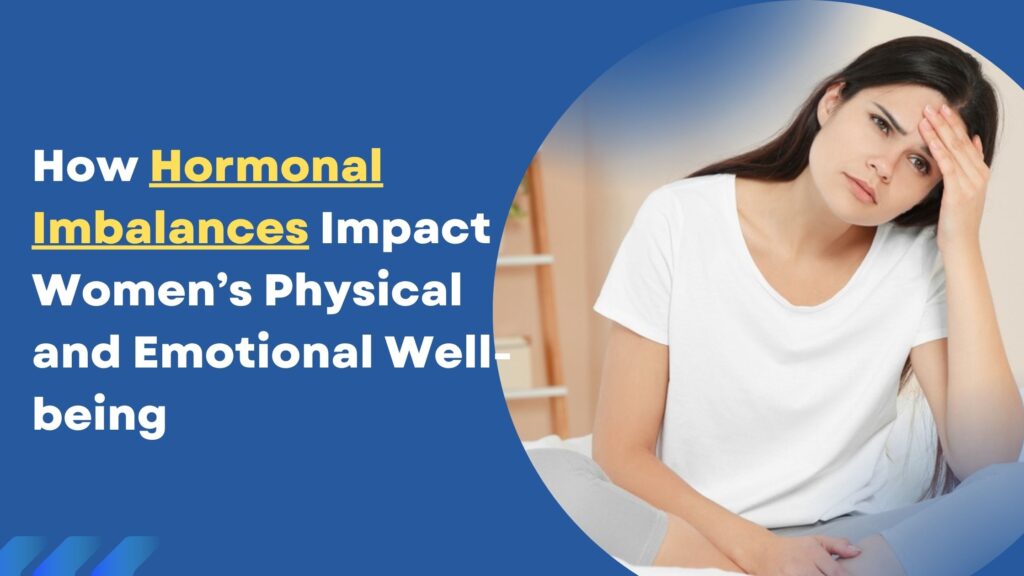How Hormonal Imbalances Impact Women’s Physical and Emotional Well-being

Hormones play a crucial role in regulating various bodily functions, especially in women. From mood swings to menstrual cycles, fertility, and even bone health, hormones affect nearly every aspect of a woman’s well-being. However, when these hormones are out of balance, it can lead to a host of health issues, some of which may significantly impact daily life. If you’re experiencing symptoms of hormonal imbalance, consulting an experienced Gynecologist in Kharadi can help diagnose and manage the problem effectively.
Understanding Hormonal Imbalance
Hormonal imbalance occurs when there is too much or too little of a specific hormone in the body. These fluctuations can disrupt normal bodily functions and lead to various health problems. Common hormones affected include estrogen, progesterone, testosterone, thyroid hormones, and insulin.
While minor hormonal changes are normal during puberty, menstruation, pregnancy, and menopause, severe imbalances may require medical attention to prevent complications.
Common Causes of Hormonal Imbalance in Women
Hormonal imbalances can arise from several factors, including:
- Stress: Chronic stress leads to an overproduction of cortisol, which can suppress other hormones like estrogen and progesterone.
- Polycystic Ovary Syndrome (PCOS): A common hormonal disorder causing irregular periods, acne, and infertility.
- Thyroid Disorders: Both hyperthyroidism and hypothyroidism affect the body’s metabolism and energy levels.
- Birth Control Pills: Contraceptives can sometimes alter hormonal levels.
- Age: Menopause and perimenopause naturally affect hormone production.
- Lifestyle Factors: Poor diet, lack of exercise, obesity, and insufficient sleep can disrupt hormone levels.
Symptoms of Hormonal Imbalance
Recognizing the signs of hormonal imbalance is essential for early diagnosis and treatment. Common symptoms include:
– Irregular or heavy periods
– Unexplained weight gain or loss
– Fatigue and lack of energy
– Mood swings, depression, or anxiety
– Low libido
– Hair thinning or hair loss
– Sleep disturbances
If you are experiencing any of these symptoms, visiting a trusted Gynecologist in Kharadi can help you get the right tests and treatment to restore hormonal balance.
Health Implications of Hormonal Imbalances
Hormonal imbalances can lead to short-term discomfort and long-term health risks, including:
- Infertility: Imbalances in reproductive hormones like estrogen and progesterone can affect ovulation, making it difficult to conceive.
- Endometriosis: This condition, linked to hormonal imbalances, causes painful periods and may lead to infertility if untreated.
- Bone Health Issues: Low estrogen levels can weaken bones, increasing the risk of osteoporosis.
- Heart Disease: Hormones play a role in maintaining cholesterol levels, and imbalances may lead to cardiovascular problems.
- Metabolic Disorders: Insulin resistance caused by hormonal imbalance can increase the risk of type 2 diabetes.
Treatment Options for Hormonal Imbalances
Here are some common approaches:
- Lifestyle Modifications: A healthy diet, regular exercise, stress management, and adequate sleep can go a long way in balancing hormones.
- Medications: Birth control pills, thyroid medications, or hormone replacement therapy may be prescribed based on the condition.
- Dietary Supplements: Vitamins like D, B6, and magnesium can support hormonal health.
- Surgical Options: In cases like PCOS or severe endometriosis, surgery may be recommended.
It’s important to consult an experienced Gynecologist in Kharadi who can customize a treatment plan based on your specific needs.
Prevention and Care
Preventing hormonal imbalances is easier with the right habits and routine check-ups. Here are some tips:
– Maintain a balanced diet rich in whole foods, lean proteins, and healthy fats.
– Manage stress through practices like yoga, meditation, or journaling.
– Stay physically active to regulate weight and insulin sensitivity.
– Schedule regular gynecological check-ups to monitor your hormonal health.
When to See a Gynecologist
If you notice persistent symptoms of hormonal imbalance, don’t ignore them. An experienced Gynecologist in Kharadi can perform the necessary diagnostic tests, such as blood work, ultrasounds, or other assessments, to pinpoint the issue.
Conclusion
Hormonal imbalances can significantly impact a woman’s physical and emotional well-being, but they are treatable with the right approach. By understanding the causes, recognizing symptoms, and seeking timely medical care, you can restore balance and lead a healthier life. If you’re in Kharadi, consulting a knowledgeable gynecologist can provide you with expert guidance and effective treatment options. Take charge of your health today and schedule a consultation for a brighter, healthier future.
